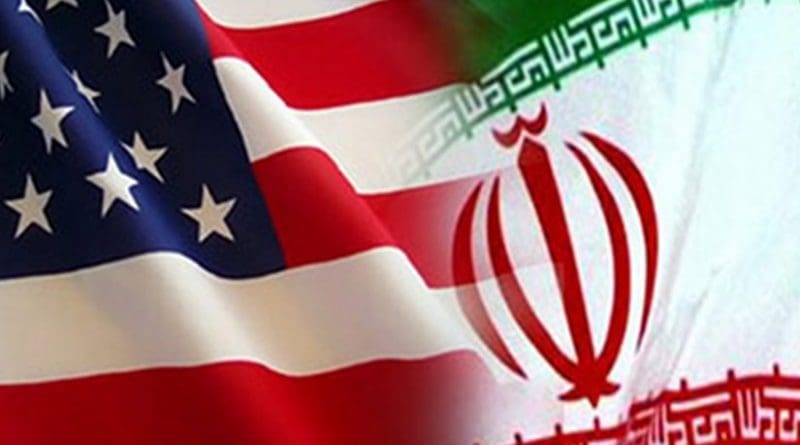Trump Gives Iran Opportunity To Set New Direction – OpEd
By Arab News
By Mohamed Chebaro*
Iranian President Hassan Rouhani chose to call for unity in a recent televised speech in a bid to answer his critics over the failure of his government to confront the country’s economic meltdown, which followed the US withdrawal from the nuclear deal and the reimposition of sanctions that are likely to cripple Iran’s oil sector from early November.
Rouhani then failed to appease the Iranian Parliament when he was questioned last week, with members choosing to ignore his justifications for the government’s helplessness as it faced adversity internally, regionally and internationally, as he described it.
Parliament’s sacking of Rouhani’s Labor Minister Ali Rabiei and Finance Minister Masoud Karbasian was not enough for the legislators to try to appease a public that has grown impatient at rapidly rising food prices, a dramatic currency collapse and the reimposition of US sanctions. Many Iranians are in a bleak mood and have not hesitated to shout slogans condemning Supreme Leader Ali Khamenei and Iran’s political class as a whole in protests in more than 80 cities.
Rouhani also hinted at bigger issues that need to be addressed with a cryptic statement that said: “No one can walk into the sea and not expect to get his feet wet.” Many believed that he was pointing to the damaging policy choices made by the regime’s religious establishment, especially since businesspeople in Iran have long been frustrated by other deep-rooted problems, such as the debt-ridden banking sector and the outsized and opaque economic role of military-linked organizations, who many in Iran believe are the source of the country’s ills.
The Iranian regime has, for four decades, been flouting international laws everywhere it sets foot. It began its existence by breaking the most basic laws of international diplomacy when holding US diplomats hostage for 444 days at the start of the revolution, and it has never abandoned such practices.
For its citizens, the regime is in the midst of a revolution 40 years after the establishment of the Islamic Republic, which has failed to provide stability in a society that has grown poorer, more likely to be unemployed, with a failing currency, and faced with rampant corruption at institutional levels, not to mention the constant deficiency of the regime in upholding its citizens’ basic rights.
The threat of Iran’s pledge to export its revolutionary system of government has not ceased to irk everyone in the Arab and Muslim worlds. Tehran’s regime has been true to its basic manifesto and, 40 years on, many of the country’s military leaders boast that they now control four Arab neighboring capitals; namely Baghdad, Beirut, Sanaa and Damascus. This has been achieved through propping up local groups like Hezbollah, the Houthis and Hamas, among others. Evidence has circulated that Iran has been encouraging the Houthi militia to target Saudi Arabian cities with ballistic missiles launched from inside Yemen, as well as attempt to disrupt maritime shipping in the Gulf and the Bab Al-Mandab Strait.
Internationally, Iran’s regime has been directly or indirectly involved in hostage taking, assassinations, the bombing of the US Embassy in Lebanon in the 1980s, and the bombing of a Jewish community center in Argentina in the 1990s. These examples are just a sample of the regime’s violent record. In recent years, including as the finishing touches were being put to the long-awaited nuclear deal brokered by the Obama administration, Iranian-American dual nationals were imprisoned in Tehran on espionage and various other charges, and were used as pawns in the final deal negotiations. More recently, Belgium, Germany and France foiled an attempt to assassinate opposition figures from the People’s Mojahedin Organization of Iran at their annual rally in Paris. A diplomat at the Iranian Embassy in Vienna was arrested on suspicion of having instigated the plan.
With such a record — that the clergy-led regime of Tehran obviously denies — Iran made the unusual step of calling on the International Court of Justice to adjudicate against the unilateral imposition of sanctions by Washington. This Iranian embrace of international law is a first, and one would hope this could present an opportunity for Tehran to rejoin the international legal frameworks that help settle disputes between nations.
Iran’s revolution will be 40 years old next year and, as the saying goes, “all revolutions devour their own children.” The Islamic Republic of Iran has been devouring its children and its neighbors’ sons and daughters for four decades without any sign that the revolutionaries are about to hang up their gloves.
Critics say Tehran squandered the opportunities presented by the 2015 nuclear deal by limiting discussions to technical aspects that limit its ability to develop a nuclear weapon for the next 10 to 15 years. In 2015, Iran refused to discuss its revolutionary policies, its support for terrorism, proxy wars, and its meddling in other countries’ internal affairs. The regime even failed to benefit from the deal, as it failed to tackle the high rates of inflation, joblessness and corruption that are rampant within the country.
US President Donald Trump’s withdrawal from the nuclear deal could therefore offer a renewed opportunity for Iran to set a new direction for its policies. Trump’s deal-making inclination should be embraced, and this could offer Iran a chance to review its policies, which have long harmed its economy and society alike.
*Mohamed Chebaro is a British-Lebanese journalist broadcaster with more than 25 years’ experience covering war, terrorism, defense, current affairs and diplomacy.

